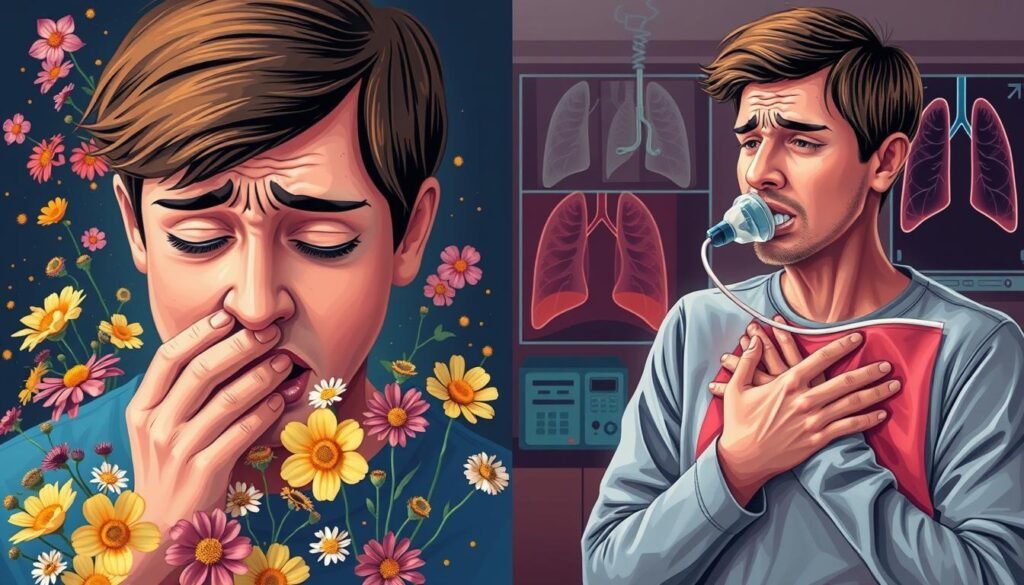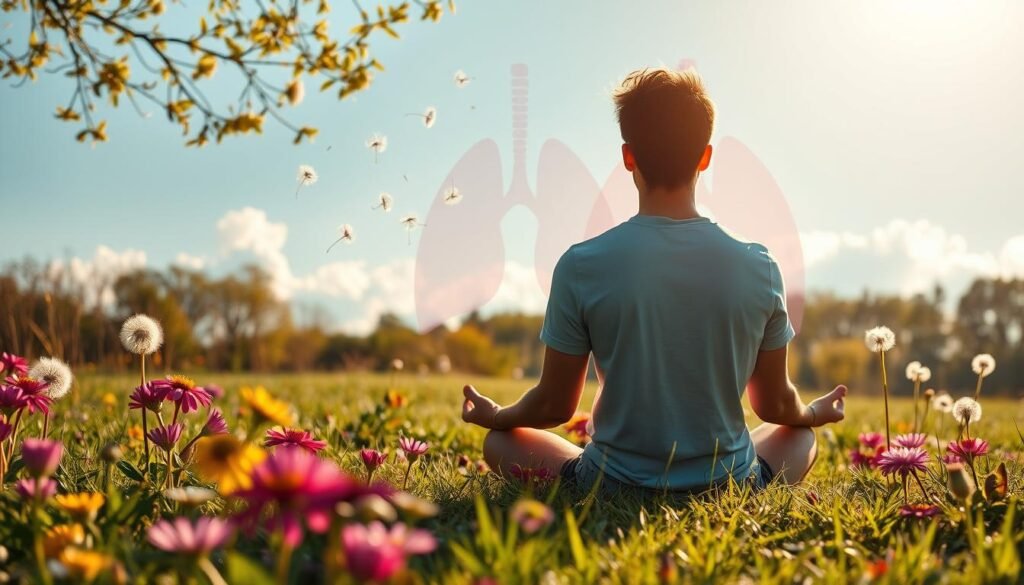Did you know that nearly 80% of lung cancer patients are diagnosed late? This fact shows how vital it is to understand the link between lung cancer symptoms and allergies. As allergies become more common, it’s important for patients to manage both conditions well. This is essential for their respiratory health and how they are treated.
Coping with both allergies and lung cancer needs a well-thought-out plan. This plan should make patients aware of symptoms of both illnesses. By managing these well, patients can feel better. It might even help make their treatment more effective.
Key Takeaways
- 80% of lung cancer patients are diagnosed at an advanced stage.
- Understanding the interaction between allergies and lung cancer symptoms is crucial.
- Effective management can improve patient quality of life.
- A proactive approach can influence treatment outcomes.
- Awareness of symptoms for both conditions aids in better health management.
Understanding Allergies and Lung Cancer
Studies show a unique link between allergies and lung cancer. Allergic rhinitis (AR) is the most common allergy, while lung cancer is a top cause of death. Research has found an inverse relationship allergies lung cancer. It suggests having more immunoglobulin E (IgE) could lower lung cancer risk.
There’s a 59% higher lung cancer risk for those with past rhinitis or sinusitis. It’s crucial to fully understand how allergies and lung cancer are connected. Bronchial asthma patients have twice the risk of lung cancer, adding to the complexity.
Women with rhinitis or sinusitis history face 2.32 times more lung cancer risk than men. The risk is higher for adenocarcinoma patients, at 1.91 times more than others.
Yet, having asthma, hay fever, or allergic dermatitis does not raise lung cancer risk much. This detail is important in understanding allergies and lung cancer.
Allergic diseases have grown over time, with more anaphylaxis cases worldwide. Atopy could increase cancer risk due to chronic inflammation and immune system overactivity.
Different theories explore the allergy-cancer link. They include chronic inflammation, immunosurveillance, and Th2 response. Together, they show how complex allergies and lung cancer are.
The Effects of Allergies on Lung Health
Allergies, especially allergic rhinitis and asthma, have a big impact on lung health. They can make existing conditions worse by triggering inflammation. This leads to more breathing problems and less lung function. Asthma patients often have allergic rhinitis. In fact, 60% to 95% of them do.
Asthma attacks the lungs, affecting millions worldwide. It causes inflammation, with cytokines like IL-4, IL-5, and IL-13 playing a big part. These cytokines call immune cells to the inflammation site. This makes the airways tighten, making it hard to breathe. So, people with lung issues suffer more from these effects.
Researchers are looking at how allergies might relate to lung cancer. Long-term inflammation from allergies could increase lung cancer risk. A study showed a link between asthma and a higher chance of getting lung cancer. This means asthma patients might face a greater risk.
It’s important to know how allergies affect lung health. This knowledge can lead to better treatment and outcomes for patients. As research continues, understanding how allergies, lung health, and cancer connect will help us find better ways to manage these issues.
| Condition | Prevalence of Allergic Rhinitis | Association with Lung Cancer Risk |
|---|---|---|
| Asthma | 60%-95% | Positive correlation indicated |
| Allergic Rhinitis | High in asthma patients | Persistent risk factors |
| Chronic Allergic Conditions | Common globally | Potential increase in lung complications |
Managing Co-occurring Allergies and Lung Cancer Symptoms
To treat both allergies and lung cancer effectively, we must understand how they are related. It’s fascinating that allergic rhinitis might actually help protect against lung cancer. Yet, many lung cancer patients also have allergies. This makes their treatment more complex.
The Inverse Relationship Between Allergies and Lung Cancer
Studies show that people with allergies might have a lower chance of getting lung cancer. This interesting finding deserves more attention. Doctors need to carefully treat allergies in lung cancer patients to manage their overall health.
Prevalence of Allergic Rhinitis Among Lung Cancer Patients
About 10% of adults have a chronic cough, and it’s worse for those with allergies. In places like Europe and the Americas, this is even more common. Doctors find that many with chronic cough also have serious lung issues like lung cancer.
To help lung cancer patients, healthcare plans must include treating their allergies. Their allergy symptoms often make their cancer treatment harder.
| Condition | Prevalence in Patients | Impact on Treatment |
|---|---|---|
| Allergic Rhinitis | High among lung cancer patients | Complicates symptom management |
| Chronic Cough | 10%-20% in developed countries | Indicates potential underlying issues |
| Lung Cancer | Leading cause of cancer deaths | Requires multi-faceted treatment approaches |
Recent research helps healthcare providers plan better treatments for lung cancer patients with allergies. Knowing how allergies and lung cancer affect each other helps treat both. For in-depth information on lung cancer signs, check out this important article.
Key Symptoms of Allergies and Lung Cancer
Knowing the key signs of allergies and lung cancer is key for early spotting and care. Allergies lead to sneezing, stuffy nose, itchy eyes, and skin rashes. Yet, these allergy signs can mix up with lung cancer signs.
Lung cancer may bring ongoing coughs, chest pain, breathing issues, and blood in coughs. Loss of weight and a rough voice are signs too. Spotting the difference gets tough as many Americans deal with allergies each year, which muddles the diagnosis.
Seeing a doctor for both symptoms is vital for a full check-up. Spotting the differences, like allergies being seasonal and lung cancer cough being constant, helps in knowing the true issue. For concerns on symptoms, check out resources on breathing workouts and treatment.

| Symptoms | Allergy Symptoms | Lung Cancer Symptoms |
|---|---|---|
| Coughing | Often due to post-nasal drip | Persistent and can worsen over time |
| Shortness of Breath | Triggered by allergens | Can indicate worsening lung condition |
| Chest Pain | May occur if allergic reaction affects the lungs | Typically associated with tumor growth |
| Nasal Congestion | Common and often seasonal | Usually not a symptom |
| Weight Loss | Rare unless severe | Common in late-stage lung cancer |
Strategies for Effective Allergy Management
Dealing with allergies alongside lung cancer needs a well-rounded plan. Identifying what causes allergies and choosing the best treatments can really help. These steps are key to feeling better and tackling lung health issues.
Identifying Allergy Triggers
Finding out what triggers allergies is crucial. Some common triggers are:
- Pollen from trees, grasses, and weeds
- Dust mites
- Pet dander
- Mold spores
To manage allergies, keep an eye on pollen levels and stay indoors when they’re high. Regular cleaning can reduce allergens at home. Using air purifiers and keeping windows closed can also help.
Optimizing Allergy Treatments
Finding the right treatment can greatly improve how you handle symptoms. There’s exciting progress in allergy care, such as:
- Allergen-specific immunotherapy (SIT) changes the way we deal with allergies, lessening the need for meds.
- New biological treatments are being used instead of traditional drugs for asthma and allergies.
- Doctors are studying combining SIT with new treatments for better results with fewer side effects.
It’s important to talk with doctors about the best medicine for your allergies. Meds like Benadryl and Zyrtec can ease symptoms like itchy eyes and runny noses. This makes your overall treatment plan more effective.
| Strategy | Description |
|---|---|
| Identify Triggers | Recognize allergens like pollen, dust, and dander. |
| Monitor Pollen Levels | Check local reports and stay indoors when necessary. |
| Clean Environment | Regularly vacuum, dust, and use air filtration systems. |
| Consult Healthcare Providers | Discuss medication and treatment options specific to allergies. |
| Consider Immunotherapy | Explore allergen-specific immunotherapy as a long-term solution. |
With the right strategies, managing allergies and lung cancer symptoms becomes easier. Taking steps to know your triggers and finding the best treatments lets you lead a healthier life.
Addressing Allergies and Lung Cancer Together
Combining treatments for allergies and lung cancer is key to better patient health. Both can harm respiratory health, making treatment tricky. Tackling both allows for plans that address their combined effects.
Specialists like allergists and oncologists working together is vital. They can create plans that focus on both allergies and lung cancer. This improves the patient’s life.
Educating patients on how allergies affect lung cancer is important. For more info on respiratory allergies, check the European Federation of Allergy and Airways Diseases Patients’ resources.
Management should include checking for allergens at home. Reducing dust mites helps asthma, aiding lung cancer patients with their breathing. Keeping humidity low and washing bedding often helps too.
In conclusion, treating allergies and lung cancer together improves health outcomes. It lets healthcare workers provide care that’s more comprehensive and specific to each patient.
Impacts of Allergies on Lung Cancer Treatment
Understanding how allergies affect lung cancer treatment is key. Allergies can make treatment for lung cancer patients harder. They can make some therapies less effective and increase side effects. Allergy issues in lung cancer care can change how well treatments work, especially for those with allergies too.
How Allergies Can Complicate Treatment Plans
Lung cancer patients with allergies face extra hurdles. Allergic reactions can interact with treatments like chemotherapy, causing problems. For example, conditions like asthma can make treatment symptoms worse. This makes following treatment plans tough. Allergies can also lower the success of medications due to inflammation.
The Role of Immunotherapy in Allergy and Lung Cancer
New progress in immunotherapy offers hope for treating lung cancer in those with allergies. PD-1/PD-L1 checkpoint inhibitors have shown good results. Researchers are even looking at IL-4 blockers to help manage both cancer and allergies. These approaches aim to lessen allergy issues in lung cancer treatment, improving results for patients.
| Condition | Impact on Treatment |
|---|---|
| Allergic Rhinitis | Can worsen respiratory symptoms, complicating chemotherapy. |
| Allergic Asthma | Increases treatment-related side effects and hospitalizations. |
| Food Allergies | May limit nutritional options, affecting overall health during treatment. |
| Atopic Dermatitis | Can result in additional skin complications, impacting quality of life. |
Balancing Allergies and Lung Issues
Finding the right balance in treating allergies and lung problems is tricky but vital. It’s important for people with both conditions. They need to work with their doctors to make personalized plans for both allergies and lungs.
Handling lung health and allergies requires a detailed plan. Treatment should look at how allergies and lung function affect each other. This includes identifying allergens, choosing treatments that don’t hurt the lungs, and avoiding known allergens.
- Identification of specific allergens that trigger symptoms.
- Use of medications that manage allergy symptoms without compromising lung function.
- Adoption of lifestyle changes to reduce exposure to allergens and irritants.
- Regular monitoring of respiratory health to assess the effectiveness of treatment plans.
Working together, allergists and lung doctors can make a big difference in patients’ lives. They develop plans that reduce allergic reactions and protect the lungs.

| Strategy | Description | Benefits |
|---|---|---|
| Identify Triggers | Conduct tests to understand specific allergens affecting the patient. | Reduces the frequency and severity of allergic reactions. |
| Medication Management | Use antihistamines or corticosteroids tailored to individual needs. | Helps control allergy symptoms while safeguarding lung health. |
| Lifestyle Adjustments | Avoidance of known allergens and pollutants in the environment. | Minimizes exposure and enhances respiratory health. |
| Routine Check-Ups | Regular visits to healthcare professionals for monitoring. | Ensures optimal management of both allergies and lung function. |
With the right strategies and teamwork, managing allergies and lung issues gets easier. This leads to better control of both conditions.
Coping with the Challenges of Allergies and Lung Cancer
People dealing with allergies and lung cancer face tough psychological effects. These can include emotional distress, anxiety, and depression. These feelings can make it harder to deal with their conditions. It’s very important to manage both the mental and physical aspects.
Support groups and therapy are great tools. They offer a chance to connect with others who understand what you’re going through. This reduces the feeling of being alone. Helpful resources can also teach you how to take care of your health needs.
Building resilience is key for patients. This can be done through mindfulness, therapy, or wellness programs. These approaches help maintain mental and emotional health. It’s crucial to find a balance between treating the illness and caring for mental well-being.
As seasons change, allergy triggers change too. Understanding this helps people manage their symptoms better. By focusing on both mental and physical health, individuals can handle their allergies and lung cancer more effectively.
Tips for Allergy Control with Lung Cancer Symptoms
Managing allergies with lung cancer requires a proactive plan. Effective home allergy management boosts your quality of life. Keeping your home clean is key; dust and vacuum often, and keep bedding fresh.

Use air purifiers with HEPA filters to clean the air. This captures allergens well. Patients need to find the right medicines for their allergies. Talking with doctors regularly helps adjust treatment for allergies and lung cancer.
Some patients might need extra help, like bronchodilators, for serious allergies. Quitting smoking and avoiding known irritants are crucial too. Following these tips for allergy control with lung cancer symptoms empowers patients to look after their health.
Conclusion
Discussing allergies and lung cancer shows how closely linked these health issues are. It’s important for both patients and doctors to get this connection. This knowledge stresses the need for integrated care.
The result of a study with 179 patients shows that custom plans work well. These plans include better pain control and help with mental health. It highlights how special care can improve how we support patients.
Research into AllergoOncology is finding out more about how allergies and cancer interact. This might help improve cancer treatment in the future. Better understanding and teamwork in healthcare can improve the lives of those with allergies and lung cancer.